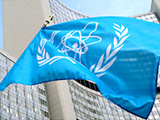|
|
TODAY.AZ / Politics
Iran answer sought on atom offer as UN watchdog meets
12 June 2006 [22:24] - TODAY.AZ

According to Reuters information agency, as the 35-nation board of the International Atomic Energy Agency (IAEA) met, Iran insisted on its right to enrich uranium but did not reject outright the package of incentives to halt such work presented by U.N. Security Council powers last week.
Iran began a new round of enrichment on the day it got the package last week. A senior Iranian official said the move was "technical, not a provocation". But Washington said it pointed up a need to get Iran to say yes or no to the offer soon.
European Union foreign policy chief Javier Solana, who visited Tehran last week to hand over the batch of trade, technological and security incentives for Iran to halt nuclear fuel work, said he expected contact from Iran by this weekend.
Washington's IAEA envoy said the ball was in Iran's court, urging it to shelve nuclear fuel work -- which the West suspects is a disguised atom bomb project -- to qualify for incentives and avoid the risk of sanctions if it rebuffs them.
"The United States and other members of the IAEA board hope this will be a decision to refrain from further enrichment-related and reprocessing activities including research and development, and to take advantage of the enormous diplomatic opportunities that lie in front of the Islamic Republic," Gregory Schulte told journalists.
A U.S. State Department official, who asked not to be identified, said Iran must not be allowed to expand a pilot uranium-enrichment programme until it becomes a fait accompli.
"We cannot let Iran consider these terms indefinitely, saying they are prepared to enter negotiations but at the same time just continuing their nuclear activities," he said.
U.S. President George W. Bush has said Iran has weeks, not months, to decide whether to accept the deal. Current EU president Austria said the Group of Eight industrialised countries summit on July 15-17 would be the deadline for Iran.
Another U.S. official said Washington was keen for developing countries comprising much of the IAEA board to endorse the big powers' initiative and to strongly urge Iran to halt enrichment, including research and development.
An Iran debate was to be held on Wednesday or Thursday.
Iran's envoy to the IAEA, Ali Asghar Soltanieh, earlier urged the body to avoid "politically motivated statements that could spoil the environment" for a diplomatic solution.
Iran says its nuclear project aims to produce low-enriched uranium for electricity. The West suspects Iran, with the world's second largest reserves of oil and gas, is secretly bent on enriching uranium to the level used to make atomic bombs.
Iranian government spokesman Gholamhossein Elham said on Monday Iran would not compromise on its right to enrich uranium. "We have obtained this technology. It is our obvious right. We do not negotiate over our obvious nuclear rights," he said.
The Iranian Foreign Ministry has said Tehran will send its own counter-proposals to the incentives package.
In a speech opening the weeklong IAEA board session, agency chief Mohamed ElBaradei said Iran was still failing to come clean with IAEA inquiries into the nature of its nuclear work.
"I would continue to urge Iran to provide the cooperation needed to resolve these issues," he said. "I remain convinced the way forward lies through dialogue and mutual accommodation."
Diplomats said the Vienna-based board would debate Iran but pass no resolutions, to avoid any diplomatic upset while Tehran considered an answer to the big power initiative.
The nuclear dispute intensified in February when the IAEA referred Tehran to the Security Council over its history of hiding atomic research and obstructing IAEA investigations.
Western diplomats say the incentives package includes a light-water reactor and an atomic fuel storage facility, as well as a rare U.S. offer to join the EU's direct talks with Iran.
Western leaders have in the past ruled out allowing Iran any domestic nuclear fuel programme. However, the new package would allow for one after an open-ended halt to enrichment work, probably lasting years, and under full IAEA surveillance.
/www.reuters.com/
URL: http://www.today.az/news/politics/27195.html
 Print version
Print version
Connect with us. Get latest news and updates.
See Also
- 01 February 2026 [16:55]
Russia sends new grain shipment to Armenia via Azerbaijan transit route - 31 January 2026 [01:46]
UN Geneva hosts high-level talks on protecting Caspian Sea - 30 January 2026 [13:13]
Karma and Canada - what does separatism taste like? - 30 January 2026 [12:41]
President Ilham Aliyev accepts credentials of Australia's newly appointed ambassador - 30 January 2026 [12:38]
President Ilham Aliyev accepts credentials of Norway's newly appointed ambassador - 30 January 2026 [12:15]
President Ilham Aliyev accepts credentials of Indonesia's newly appointed ambassador - 30 January 2026 [12:12]
Abramyan and the Unexpected Piano on the Garden Ring - 30 January 2026 [12:03]
President Ilham Aliyev receives credentials of newly appointed ambassador of Greece to Azerbaijan - 30 January 2026 [11:11]
Paris marks demise of "Armenian question" - 29 January 2026 [12:12]
How Russian propaganda is destroying their country
Most Popular
 Karma and Canada - what does separatism taste like?
Karma and Canada - what does separatism taste like?
 Armenian Billion-Dollar Fraud Scheme Exposed in Los Angeles
Armenian Billion-Dollar Fraud Scheme Exposed in Los Angeles
 President Ilham Aliyev accepts credentials of Australia's newly appointed ambassador
President Ilham Aliyev accepts credentials of Australia's newly appointed ambassador
 President Ilham Aliyev receives credentials of newly appointed ambassador of Greece to Azerbaijan
President Ilham Aliyev receives credentials of newly appointed ambassador of Greece to Azerbaijan
 Trump warns UK against deepening business ties with China
Trump warns UK against deepening business ties with China
 President Ilham Aliyev accepts credentials of Norway's newly appointed ambassador
President Ilham Aliyev accepts credentials of Norway's newly appointed ambassador
 Azerbaijan's Sea Breeze mega project presented in the UK
Azerbaijan's Sea Breeze mega project presented in the UK
